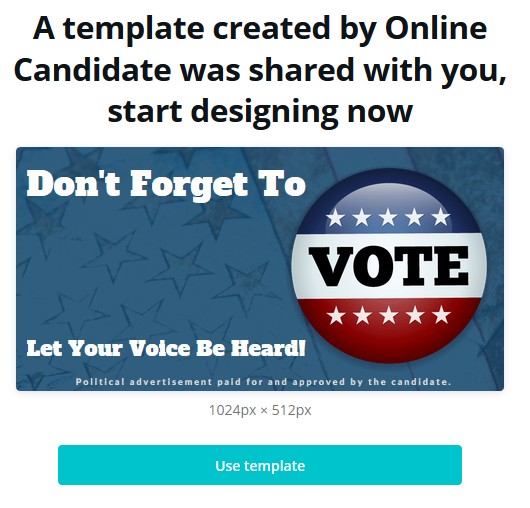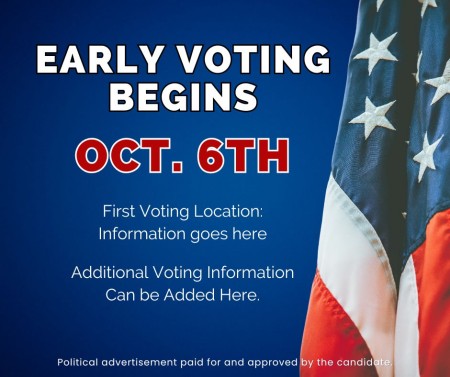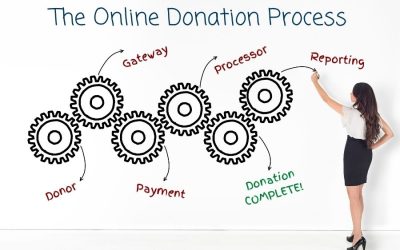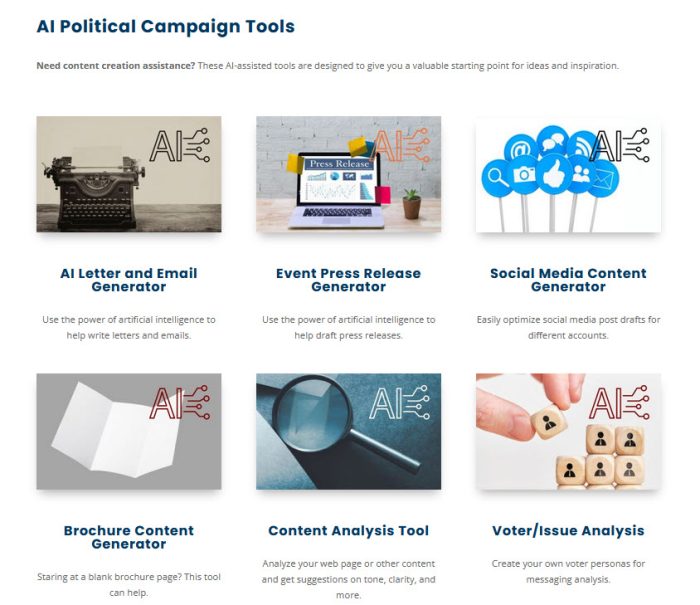How to Raise Political Donations Online: A Step-by-Step Guide for Candidates
The internet has changed the way we communicate, the way we shop, and even the way political candidates reach and influence voters.
Raising money online is a relatively inexpensive form of fundraising. Today, online donations can be made effortlessly from a desktop or laptop computer, tablet, or even a mobile phone. It allows political campaigns to reach out to more people than they would be able to otherwise. However, some candidates are unsure if raising money online is worth the effort or if their campaign is large enough to accept digital donations.
The truth is, whether you’re running for school board, city council, or county clerk, online fundraising can give your campaign the edge it needs to win—by helping you reach more supporters and raise more money with less effort.
Below is a brief overview to help you understand how online donations work—and how your campaign can start benefiting from them today. We’ll also discuss the benefits of online fundraising for local candidates like you.
The anatomy of an online donation
Here’s a quick breakdown of what happens when someone donates through your campaign website:
- After clicking the “Donate Now” button or link, your supporters will enter their billing and donation information into a simple web form.
- After submission, a payment gateway takes over. The payment gateway is a service responsible for verifying and electronically moving funds. In plain terms, it makes sure the donor’s credit card is valid and then processes the donation.
- When the payment transaction is complete, the donor is shown a confirmation page and sent an email confirmation. At this point, a record of the transaction becomes available for reporting purposes, and the donation process is complete.
- After a period of time, the money is transferred from the payment processor to the bank account of your campaign.
You don’t need to worry about the technical details—just know that with a reputable donation platform, this process is safe, secure, and fast.
What third party payment processors do
Third-party payment processors provide a simple and relatively inexpensive way to accept payments online without the extra cost and obligation of setting up a complex merchant account. Most services are free to set up and include a variety of tools such as forms, social media widgets, and data tracking. They charge a small percentage of the transaction as a payment fee.
Before you can start collecting donations, you’ll need to set up an account with a payment processor. Your organization will need to verify its non-profit campaign status and bank account information. Be prepared to offer additional documentation about yourself as a candidate and your organization. It’s a good idea to get this set up early, since verification can take a few days.
Donation platform selection
When picking a payment processor, choose one designed for political campaigns or nonprofits. These platforms understand the unique requirements candidates face and often offer compliance features to help you follow campaign finance laws.
- Transaction Fees: Lower transaction fees mean more of your donors’ contributions go directly to your campaign.
- Integration: Ensure it works smoothly with your website and social media. Some platforms allow for embedded website forms; others require that you link out to the processor’s form.
- Recurring Donations: Check if the service supports recurring contributions for steady income throughout the season.
- Reporting and Analytics: Look for processors that offer robust financial reporting tools. This should simplify your treasurer’s workload.
See the article below for recommendations on choosing a platform that is best for you.
Related: Comparing Political Donation Platforms – Our Recommendations
Why you should accept donations online
Money is the lifeblood of any political campaign. That’s not new. What has changed is how easy it is to collect donations online. Here are several reasons why your campaign needs to raise money online:
For candidates in school board elections or local municipal offices, every dollar counts. Traditional fundraising methods like in-person events and mailers are still valuable, but they take time and money to organize. Online fundraising gives you another powerful tool to reach supporters quickly, spread your message, and raise funds without the overhead.
- Online fundraising is easy to start. If you’ve gone through the paperwork and requirements just to run for office, setting up an online fundraising program
 will be easy. You’ll need a campaign bank account to take donations, an online fundraising system, and a prospect list. If you have your bank account and prospect list, then it’s just a matter of choosing how you will take donations online.
will be easy. You’ll need a campaign bank account to take donations, an online fundraising system, and a prospect list. If you have your bank account and prospect list, then it’s just a matter of choosing how you will take donations online. - Online fundraising is easy to set up. Most online donation platforms are easy to set up, with customizable donation pages, widgets, tracking and more. These features are easy to add to your website or social media accounts.
- You can reach out through multiple channels. You can use social media, email, texting and even offline methods to drive supporters to either your primary donation page or specific pages set up to track different sources.
- Your opponent will use digital channels to raise money. Most political candidates today are using the internet to organize, raise money, and get the word out about their candidates. If you are not leveraging online opportunities, you can be sure that your political opponents will.
It’s like the New York Lotto – You gotta be in it to win it!
Most individual political contributions are for small-dollar amounts. By providing an easy-to-use and convenient donation system, you are more likely to receive more donations.
There are a lot of scary elements to campaign finance, but setting up an online donation tool doesn’t need to be one of them. In fact, your campaign treasurer will probably find it easier to track digital donations than to manage checks or cash. Many online donation platforms help simplify compliance and make financial reporting much easier.
And don’t forget—check your local and state laws regarding contribution limits and disclosure requirements. Most political donation platforms can help you stay compliant, but you and your treasurer should always confirm you’re following the rules.
Related: Maximize Your Funds: Must-Know Political Fundraising FAQs
Create your online pitch to donors
Your campaign website needs a designated donation page. Make it crystal clear why their donation matters. Explain where the money will go—whether it’s for printing more brochures, running ads, or covering event costs. Keep your message short and focused—2-3 lines is enough. Make it personal and direct.
Your political donation form should be front and center.Avoid cluttering the page with too many links or distractions. When someone clicks “Donate,” they’re ready to act, so don’t slow them down.
Conclusion
The web alone won’t solve your campaign’s funding needs. You still need to canvass, make phone calls, and hold fundraising events. But adding online fundraising to your strategy gives you another powerful tool to reach supporters and raise money.
Don’t wait—every day without an online donation form is a missed opportunity. Get started today!
Get started with an affordable campaign website with Online Candidate.
How Much Money Do You Need to Run a Political Campaign?
Planning a political campaign can be both exciting and challenging. One of the first questions you’re likely to ask is, “How much money do I need?”
That answer, unfortunately, is: “It depends.”
Every candidate must develop a robust political campaign budgeting plan. You need a solid grasp of campaign finance rules and your local election spending laws. This can make the difference between a well-funded campaign and one that struggles just to make it to election day.
The amount of money your campaign needs depends on various factors. Here’s a basic guide through the budgeting process for local political campaigns.
How Much Did Previous Elections Cost?
One invaluable resource for understanding the financial landscape of your local campaign is to examine the financial records of past elections for the same position. This will give you real-world insights into what successful candidates have spent in the past.
Take a look at the spending habits of incumbents as well as their challengers. Did the incumbent spend significantly more or less than their challengers? What was the success rate of candidates who spent more or less money?
You can access financial information on past elections through several sources:
- Local Election Authority: Your local election authority or county clerk’s office responsible for overseeing elections often maintains records of campaign finance reports filed by candidates and committees for previous elections. They can provide you with access to these reports or guide you on where to find them.
- Online Databases: Many local governments and election authorities maintain online databases where you can search for campaign finance reports and contributions.
- State Election Commission: Some state-level election commissions or boards may maintain central databases of local campaign finance records.
- Local Newspapers and Media: Local newspapers and media outlets may have covered campaign spending during previous elections. You can search their archives for information.
- Political Parties: Your local political party may have historical data on campaign spending in your area.
- Local Campaign Consultants or Advisors: Local campaign consultants or advisors with experience in your area may also have access to historical finance data or can help you find this information.
By studying past campaigns for the office you seek, you can determine any relationship between money spent and electoral success. For example, in a recent mayoral race in Austin, Texas, the winning campaign’s budget analysis revealed that allocation towards social media engagement raised more donor contributions when compared to traditional mailers.
The amount you will need to spend on outreach will vary, as the size of your city or a growing electorate can impact your costs. Running TV ads, cable ads, or billboards in New York City will cost much more than in Marrero, Louisiana.
And don’t forget personal expenses. And we’re not just talking about personal in-kind donations. As a candidate or staff member, you’ll be spending plenty of personal time and effort on the campaign trail. You may not be able to quantify that into dollars, but there is a personal cost.
Our clients have campaign budgets that range from almost nothing to tens of thousands of dollars. Unfortunately, many start running for office without first having a clear idea of the resources required to get elected.

Get ready to go over the numbers… again and again.
Determining Your Campaign Budget:
Once you have an idea of how much money you’ll need, you’ll want to set a campaign budget. If you’re running for council in a small town, your budget might be around $2,500. But a countywide campaign might require $20,000 or more.
Let’s break down the major categories of campaign expenses and give you a clear idea of what to expect.
Campaign Staff:
Campaign staff plays a vital role in the success of your local campaign. They include a Campaign Manager, Field Organizer, Communications Director, Fundraising Coordinator, Volunteers, and Consultants. In smaller campaigns, consultant roles are typically filled by volunteers with specific expertise.
Of course, you’ll also need a Campaign Treasurer. This is a critical staff role. The treasurer is responsible for tracking expenses and donations, keeping accurate financial records, managing the campaign budget and bank accounts. They are also responsible for filing financial reports in compliance with campaign finance laws. In short, a treasurer manages and documents all the financial activities.
The size and scale of your campaign will determine your staffing needs. Smaller local campaigns can be successful with a team of dedicated volunteers. Larger campaigns may require more specialized roles and, possibly, paid staff members.
Online Presence:
A robust online presence is essential for reaching and engaging voters effectively. Here’s what you’ll need to establish a digital foothold:
- Campaign Website
- Online Donation Platform
- Email Marketing
- Social Media Presence
- Online Advertising
- Text Messaging Campaign
- Analytics and Tracking
- A Content Strategy
You’ll need an online presence to help communicate your message effectively. Some candidates may not choose to have a more limited digital presence, and that’s okay. You should use your resources where they will do the most good. However, investing in a website for the candidate and a way to take donations online should always be considered.
Door-to-Door Campaigning:
Doorbell materials, like brochures and doorknob hangers, are important. Get quotes on the price to design and print these materials. Budget for personalized follow-up postcards and mailers, and set aside some funds for “quick response” mailers to counter unexpected events.
We’ve seen this happen where an opponent waits until close to election day to come out with a new attack line. Without money in reserve, the candidate was unable to properly respond. Some voters take silence as acquiescence. You always want to define yourself to voters and not leave the job to your opposition.
Paid Media:
This may be the bulk of your campaign expenses. You’ll allocate the majority of your budget to paid media for your messaging. For example, if you have a $2,500 budget, consider spending $1,000 on paid media. The more you can spend on paid media, the better.
Remember, no one ever lost an election by spending too much on advertising.
“Politics has become so expensive that it takes a lot of money even to be defeated.” – Will Rogers
Miscellaneous Costs:
There will be a number of additional expenses that will come up. Some will be large, others small. Some costs, like campaign events and rallies, can’t be calculated with much specificity until details are known. Other costs, like filing fees, are standard and are an easy line item to fill out.
Don’t forget to budget for:
- Filing Fees
- Legal and Compliance Costs
- Office Expenses
- Printing / Photocopying
- Campaign Events
- Photography
- Lawn Signs
- Transportation
- Security Measures
- Emergency and GOTV Fund
And budget for miscellaneous expenses so you’re better prepared for any unexpected costs.
Nice, But Not Necessary:
Avoid racking up expenses on cheap campaign trinkets (buttons, magnets, etc.). They may be fun, but they really don’t move the needle in terms of growing voter support.
When Do You Need The Money?
Show you’re serious by raising money early. A good rule of thumb is to have about 30% of your estimated budget raised within the first month. This seed money will cover upfront costs like campaign materials, website development, and staff salaries. Early fundraising success signals to potential donors that your campaign deserves their consideration.
Many local candidates make the mistake of starting small and hoping to snowball success throughout the election season. But you’ll find that time is too limited. You need a strong start. Put together your fundraising strategy before you announce your candidacy.

“In all, just 158 American families had donated half of all the money to candidates on the ballot [in the 2016 election].” – Evan Osnos, Wildland: The Making of America’s Fury
How To Start Raising Funds:
Start with friends, family, and local activists as your primary sources. Be ready to make actual phone calls, as it’s the most effective way to raise money. Don’t fall into the belief that you can avoid personally reaching out for help.
Check the specific election laws and regulations in your area. They dictate when you can raise money, how much supporters can contribute, and specific financial filing requirements.
Related: How Local Candidates Raise Money
Breakdown of Local Campaign Costs for Town Council:
Here are some (very) rough estimates of costs and expenses broken down by major categories. Actual expenses will vary depending on the size of your district, the competitiveness of your race, and your overall campaign strategy. You may also decide to allocate more or less for specific line items depending on these factors.
Sample Political Campaign Budget:
- Candidate Filing Fee: $500 – This is the fee required to officially file your candidacy.
- Campaign Materials:
- Yard Signs: $1,500 – Printing and distributing yard signs with your campaign logo and message.
- Brochures and Flyers: $2,000 – Design and printing of campaign brochures and flyers.
- Banners and Posters: $500 – Creating banners and posters for campaign events and rallies.
- Campaign Website: $700-2,000 – Development and hosting of a campaign website to inform voters about your platform and events. This may include related online services like an email vendor.
- Advertising:
- Online Ads: $1,000 – Running targeted online ads on social media and local news websites.
- Local Newspaper Ads: $800 – Placing advertisements in local newspapers.
- Campaign Events:
- Town Hall Meetings: $800 – Hosting town hall meetings to engage with voters.
- Meet-and-Greet Events: $500 – Organizing events for one-on-one interactions with constituents.
- Campaign Kickoff Rally: $1,000 – Hosting a campaign kickoff event to generate enthusiasm.
- Campaign Staff and Volunteers:
- Campaign Manager: $3,000 – Hiring a part-time campaign manager.
- Field Organizer: $2,000 – Paying for a part-time field organizer.
- Volunteer Coordination: $500 – Expenses related to volunteer recruitment and management.
- Travel Expenses: $1,200 – Budget for travel within the town to attend events and meet constituents.
- Compliance and Professional Expenses: $1,500 – Consultation and expenses related to campaign finance reporting and compliance with election laws.
- Get-Out-the-Vote (GOTV) Efforts: $1,000 – Phone banks, canvassing, and transportation cost estimates for voters on election day.
- Campaign Merchandise: $600 – Ordering campaign merchandise such as volunteer T-shirts.
- Miscellaneous Expenses: $1,000 – Budget for unexpected or miscellaneous campaign expenses.
- Contingency Fund: $2,000 – Reserve for unforeseen costs or emergencies during the campaign.
Total Estimated Budget: ~$17,500
The bulk of your spending (70-80%) should be dedicated to voter outreach. Create a detailed budget tailored to your campaign’s needs and potential resources. Try to secure quotes and actual cost numbers as early as possible.
Tip: Inflation has been higher over the last few years. Prices from a few years ago are likely higher today. Take this into account when budgeting rough numbers.
Conclusion:
Local campaign finance can be tricky. Research some nail down rough numbers when you start. As your campaign starts to take shape and you begin raising and spending money, your numbers will start to take more shape. Stay flexible and prepared for unexpected expenses.
Good luck!
Free ‘Early Voting’ Graphic Template
Early voting isn’t just a convenience for voters—it’s a strategic opportunity for political campaigns. As the early voting window opens in many regions, it’s a time to rally supporters and gain an edge.
To help get the word out, we’ve created a social media template for you!
The graphic design template below is sized for Facebook. Customize it to match your campaign: tweak the colors, change the text, embed your campaign logo, or even restructure the layout. When you are finished, download your image and post it across your digital channels.
How to use this template
Create an account with Canva. The free version is enough for most users.
Click on the links below to open the templates. You will be brought to a page for each template that looks something like this:

The page displays a template preview along with a button that says “Use Template“. Simply click that button to start editing the template. You can also make a copy so that you can keep an “original” template your Canva account.
From there, you can edit any or all elements and make it your own. Then download your image as a JPG, PNG or PDF for your use. (We recommend social graphics as PNG files; web graphics as JPGs.)
Early Voting Template

As election day approaches, don’t let up on your campaign’s momentum! Remind your supporters about early voting and give them the information they need. In tight races, early votes can be the deciding factor – and your key to victory.
You can find more political graphic templates, brochure, and voter guide templates on our resources site.
Have an eye on running in the next election? With Google taking longer than ever to index content, it’s crucial to start your online presence. Get ahead and start a website for your campaign today.
Write an Optimized Political Press Release
A well-written online press release is an essential publicity tool for political campaigning. Think of a press release as a concise, news-driven narrative about your campaign, specifically crafted for distribution to media contacts. In this article, we cover when to write a press release, the best practices in writing one, and how to promote your release when it’s ready.
Examples of newsworthy press releases:
There are many times during a campaign when it makes sense to put out an announcement.
- Entry into a political race: Announces a candidate’s decision to run, marking their official entry into the election race.
- Political campaign launch: A candidacy announcement press release kicks off the campaign, highlighting its key themes and objectives.
- Policy proposal announcement: Unveils new and detailed policy platforms, outlining the candidate’s specific plans and approaches to key issues.
- Voter outreach campaign: Details initiatives aimed at engaging and connecting with specific voter demographics.
- Coalition formation announcement: Publicizes the creation of supportive groups or alliances, showcasing broad-based support and collaborative efforts.
- Campaign milestone celebration: Shares notable achievements in the campaign, such as reaching fundraising goals or significant organizational benchmarks.
- Financial transparency report: Provides an overview of the campaign’s financial status, highlighting fundraising amounts and demonstrating financial transparency.
- Upcoming event or fundraiser: Promotes an event, driving attendance and fundraising efforts.
- Campaign event recap: Summarizes the achievements and highlights of recent campaign events or rallies, emphasizing their impact and success.
- Candidate position statement: Clarifies the candidate’s stance on specific issues or policies.
- Focus on local issues: Addresses key topics and concerns that are important to specific constituent’s communities or regions, reflecting the campaign’s commitment to local and regional interests.
- Key endorsements: Publicizes support from influential figures or organizations to boost credibility.
- News related to the campaign: Shares significant developments or milestones within the campaign.
- Reaction to a recent event: Provides the candidate’s perspective or response to current events or issues.
- Reaction to an opponent’s comment or action: Addresses and counters statements or actions by political rivals.
- A public apology: Addresses mistakes or controversies, aiming to restore public trust.
- Post-election announcement: Delivers a victory speech or concession, outlining the next steps post-election.
- Crisis management: This release responds to emergencies or scandals, aiming to manage and mitigate negative impacts.
Press releases are also an important part of an online press kit and play a key part in any political campaign’s playbook. When done right, a press release grabs the media’s attention and helps shape the story they tell about the candidate. This is important because it’s not just about getting coverage; it’s about steering the conversation. The right press release can sway public opinion, helping voters see the candidate in a positive light.
It’s all about controlling the narrative and making sure the candidate’s key messages hit home with voters, no matter the situation.
Time your releases for maximum effect
- Entry into the race: The timing of your important announcement will vary based on the position sought, the campaign, and the opposition. Announcing too early will have less impact than when it is closer to the election season. Once you’ve officially announced your entry into the race, you’ve basically ‘thrown your hat in the ring’. Then you are fair game for whatever comes along. Just be sure you are ready before you make that big announcement.
- Website announcement: Simultaneously announcing your candidacy and your campaign’s website is ideal, but only do this if you have a working website.
- Position statements: Address issues as they arise with strong position statements. This lets the voting public know where you stand. They also provide a good reference for your campaign staff, keeping everyone on the same page.
- Endorsements: When possible, coordinate the endorsement press release with the endorser so that they are released together for maximum impact.
- Campaign event: The timing of this can be variable. Your supporters will typically know about the event before it is made public. If it is an event that requires reservations, be sure to promote it early. If it is an open event or fundraiser, you may want to do several releases, with the final one just before the event.
- Post-fundraiser event: Send this press release as soon as possible. Use this opportunity to promote the host or special guest. It’s a great way to re-emphasize your campaign endorsements.
Additional situations requiring public comment
- Reaction to an opponent’s comment or action: In the heat of a campaign, swift responses are crucial. Don’t delay in making a statement if necessary.
- Political apology: Sometimes things go wrong on the campaign, sometimes terribly so. If a candidate makes a gaffe that requires a public apology, the best way to handle this is through a release that succinctly states the candidate’s or campaign’s position and apologizes as needed. Do these as soon as possible and move forward.
- Post-election press release: Win or lose, take time to thank your supporters publicly soon after the election results are finalized. Personalized letters should be sent to individuals as well. This should be done soon after the election results are finalized, but not so soon that it appears that the thank-you was pre-written.

How to write a political press release
First, make sure you actually have a newsworthy story. Each campaign press release should focus on a single story or issue.
Now, let’s ensure your press release not only informs but also stands out. Here are some key elements to include:
Step 1: Clear Headline and Subheadline: Your title should be catchy and engaging while encapsulating your campaign’s essence. Incorporate relevant keywords, such as the district or office you’re running for, to optimize search engine visibility.
Step 2: Summary in the First Paragraph: Begin with a succinct overview of your story, emphasizing its newsworthiness. Consider starting with a compelling fact related to your campaign. Keep sentences and paragraphs concise for easy readability.
Step 3: Detailed Body: Dive into the main body, providing comprehensive information about your campaign, candidate, or key issues. Support your statements with credible research or statistics. Maintain a focused and businesslike tone, utilizing the active voice. Including quotes from the candidate or other relevant individuals can enhance credibility and reader engagement.
- Use the Third Person: Always write your press releases in the third person to maintain professionalism and objectivity.
Step 4: Conclusion and Contact Information: Summarize the main points and direct readers to where to find additional information. Include a clear call to action, guiding readers on their next steps. Include your organization’s contact details, such as a name, email address, website link, and phone number. This information helps facilitate follow-ups from journalists or interested parties. You can also include a “Paid for” disclaimer if it is not clear who is behind the release.
Step 5: Conciseness is Key: Keep your press release concise, with a maximum of around 300 words. Proofread meticulously to avoid errors. Timing is critical, so plan your releases strategically to allow for proper editing and publication by the media. Consider your distribution strategy to ensure maximum reach and impact.
Additional writing tips:
- Use Subheadings for Improved Organization: To enhance readability and organization, consider adding subheadings within your press release.
- Engagement Through Real-World Examples: To make the content more engaging, incorporate real-world examples or case studies where relevant.
- Citations for Credibility: When discussing statistics or research, provide citations or references to bolster the credibility of your information.
- Conclusion: End your article with a brief summary of key takeaways, reinforcing the importance of effective political press releases.
Avoid the temptation to ‘editorialize’ your release with unsourced facts or opinions. Write your release in an unbiased manner that is factual and accurate. Editors may remove fluff and hype, or they may disregard your release altogether.
What should you do with your release after it’s written?
Writing a campaign release is one thing. Getting it out to the masses is another. To boost your press release’s visibility, consider implementing the following additional steps:
- Post your release to your website: Dedicate a section on your website for news and updates, where you can publish your press releases.
- Share it on social media: Leverage your social media accounts to share a link to your press release on your website. Encourage your followers to share it as well, expanding its reach.
- Submit to newspapers and local media outlets: Customize your press release to fit the editorial standards for local newspaper submission. Make it as easy as possible for editors to consider your release by ensuring it’s well-written and ready for publishing.
- Share with public relations syndication services. There are a number of paid online press release distribution services, like EIN Presswire and Ciscion PRWeb. Local races usually do not need the wide syndication that some services offer. And don’t assume that your story will be picked up by a major news outlet, either. It probably won’t.
When dealing with media outlets, try to develop a relationship with reporters and editors. Part of your media strategy should be to help reporters cover your campaign. You can’t tell them what to write, but you can help them with the facts and information. Being easily available for an interview or comment can also help a candidate get more exposure.
Most campaign releases do not need to be released to a nationwide audience. If you are interested in wider distribution, consider using paid PR services. For a fee, these services distribute your release to top-tier media outlets, such as CBS, NBC, national newspapers, Google News, and Bing News. You can also include additional images, videos, and other profile-related content.
Finally, a good political news release requires accuracy. Interesting headlines and well-organized content are essential. Timely replies and strategic dissemination boost impact. Mastering these basics will help your campaign exposure and help spread your message.
Example Press Release Announcing Campaign:
For Immediate Release Simon Smith Announces Candidacy for Supervisor of TinyTown TinyTown, [State] — [Date] — Today, Simon Smith, a long-time resident and dedicated community member of TinyTown, formally announced his candidacy for the position of Town Supervisor. With a focus on fiscal responsibility and community-driven policies, Smith is committed to steering TinyTown towards a sustainable and prosperous future. In his announcement, Smith emphasized the urgent need for financial reform: "We need to get TinyTown's budget under control and reduce spending." Smith, who has been instrumental in various community initiatives over the years, brings a wealth of experience to his candidacy. His background in business and six-year stint on the Town Board helps him understand the needs of TinyTown's residents. As Supervisor, Simon Smith plans to:
-
Implement comprehensive budget reforms to ensure fiscal stability.
-
Foster transparency and accountability in town governance.
-
Promote community engagement in decision-making processes.
-
Encourage sustainable development that aligns with the town's character and values.
Smith's campaign is built on the pillars of integrity, responsibility, and community. He is committed to making TinyTown not just a place to live, but a thriving community where every resident has a voice. For more information about Simon Smith and his campaign for TinyTown Supervisor, visit SimonSmithSupervisor.com. Contact:
-
Name: [Campaign Contact Person]
-
Email: [Contact Email]
-
Phone: [Contact Phone Number]
-
Campaign Website: [Website URL]
Paid for by Friends of Simon Smith
Don’t recreate the wheel. Create professional, powerful press releases with our Political Letter Templates. It includes easy-to-use letter and press release templates that you can use right away in your campaign correspondence.
Gear Up for November – Time to Kickstart Your Campaign!
We hope you’re doing well and enjoying the last remnants of summer. But here’s a friendly reminder: Labor Day has come and gone, and the political season is officially here.
If you’re already gearing up for an election in November, great! If if you haven’t started, don’t panic; there’s still time, but the clock is ticking.
Here are some essential actions you should be taking in September to ensure you’re on the right track for a successful November election:
Craft Your Message: Your message should resonate with your constituents. What’s your campaigns unique selling point? What issues matter most to your community? Hone in on these and articulate them clearly.
Launch Your Campaign Website: It’s non-negotiable. Your candidate website is the hub of your online campaign. It should be informative, user-friendly, and visually appealing. Share your vision, mission, and key issues. Make it easy for supporters to donate, volunteer, and get in touch.
Conquer Social Media: Create profiles on major social platforms like Facebook, Instagram and X/Twitter. Consistency is key – post regularly, engage with your audience, and don’t shy away from being authentic.
Build an Email List: Start collecting email addresses from supporters. An engaged email list is a campaign’s secret weapon. Send out regular updates, policy highlights, and calls to action.
Fundraising Frenzy: Launch your fundraising efforts ASAP. Host fundraisers, set up donation links on your website, and reach out to donors. Every dollar counts in politics. (And open a campaign bank account!)
Offline Activities: Remember, it’s not all about the digital world. Attend local events, town halls, and meetings. Start canvassing, distribute flyers, and build a grassroots network.
Volunteer Recruitment: Every campaign needs help—and a lot of it. Start recruiting, training, and organizing volunteers. They can be your boots on the ground and your voice in the community.
Policy Development: Remember the first point about crafting your message? You’ll want to fine-tune your policies and be prepared to discuss them with constituents and the media.
Legal Compliance: Don’t forget the paperwork and filing dates! Ensure your campaign is compliant with all election laws and regulations.
Debate Prep: If you’re facing debates this fall, begin preparing now. Practice your talking points and anticipate potential questions. Practice in front of a group for feedback.
Remember, this is a brief overview of what’s needed over the next few months. The key is to stay focused and organized. Maintain a steady presence both online and offline.
The road towards victory is challenging, but with commitment and an effective strategy, you can make it happen!
For more content, social media templates, and tools, visit OnlineCandidateResources.com.
Harnessing AI’s Creative Power for Your Political Campaign
From congressional and state campaigns to even local races, candidates have embraced artificial intelligence tools to improve their campaigns in a variety of ways.
When generative AI (artificial intelligence) exploded on the scene in late 2022, it was a tipping point that launched an explosion of innovation and creative tools.
A primary use of AI is to enhance content creation. This typically includes writing or enhancing social media posts, advertising copy, email newsletters, and website material. Many political campaigns and consultants today are using generative AI.
Wait, what is generative AI? It’s a type of technology that helps create text, images, voice, and even music. It’s like having a smart writer or artist on your computer who can come up with new and original things by learning from lots of examples. Just like you might learn to draw by looking at many pictures, generative AI learns from a massive set of training data and then uses that information to make its own unique creations.
AI is evolving and upgrading rapidly. It’s a bit like how the Internet started evolving in the late 1900s, but on a much faster scale.
Understanding ChatGPT
 ChatGPT is a generative AI model developed by OpenAI. It is designed to understand and generate human-like text. Based on user input, or prompts, it generates coherent and contextually relevant responses in a conversational format. During a conversation, ChatGPT remembers the conversation history along with the current user prompt to predict and generate the next logical response.
ChatGPT is a generative AI model developed by OpenAI. It is designed to understand and generate human-like text. Based on user input, or prompts, it generates coherent and contextually relevant responses in a conversational format. During a conversation, ChatGPT remembers the conversation history along with the current user prompt to predict and generate the next logical response.
While it may seem intelligent, ChatGPT and other generative AI tools do not possess true understanding or intelligence. Instead, it generates responses, or outputs, that are based on patterns it has learned through its training data.
In its most basic form, ChatGPT is easy to use. Here’s an example of how it works:
- Setting the Stage: Start by giving ChatGPT a prompt. For instance, let’s say you want to brainstorm ideas about a specific campaign topic. You may want to begin with an explanation of what you are looking for. “Assume the role of a political advisor. Here are the basic points of our campaign platform for [issue type].” Then include an overview of a specific issue and your position on it. You may want to go into some detail on this.
- Guiding the AI: You input a prompt like, “Give me 5 ideas for a blog post about [issue].”
- AI Output: ChatGPT processes your prompt and uses its knowledge to craft five unique ideas for your blog post, based on the earlier information you provided. This provides you with a variety of concepts to consider.
Sample Prompts:
- Draft Campaign Updates: “Write a social media post about our stance on education reform.”
- Tailor Messaging: “Here is our issue position: [Add your text.] Craft a message for suburban voters emphasizing our commitment to [issue].”
- Polish Communication: “Edit this email to make it more persuasive and impactful. Our audience is voters who [add detail].”
Most AI tools use a similar prompting method, though some may include form fields instead.
While AI can provide valuable assistance, the user is ultimately accountable. AI should be utilized as a valuable tool rather than a substitute for real voices and opinions.
There are new AI tools and applications being launched every month. Some focus on text; others, like Midjourney, can be used to create unique images. There are even applications for video and audio use.
Enhancing your campaign content with AI
There are many ways that AI can elevate your campaign content. Here are some ideas:
- Content Generation: AI can be prompted to generate or rewrite social media posts, press releases, brochure text, campaign website copy, phone scripts, canvassing scripts, and more. Beyond text, you can prompt the output to include such things as emojis and hashtags.
- Cultivating Ideas: Based on your prompts, the AI can generate creative ideas that your team can expand upon. This requires prompts that encourage the AI to brainstorm ideas related to your campaign’s themes, issues, and events.
- Optimizing Content: Refine your content by providing specific guidelines and objectives for improvement. For example, you can instruct the AI to write or rewrite content to specific readability levels, grammatical standards, and stylistic preferences. One tip is to instruct the AI not only to suggest specific edits but to explain why it did so.
- Personalizing Material: You can take your existing content and prompt AI to modify it to appeal more to a specific demographic. For example, you may want to refine your health care information for senior citizens so that it focuses on aspects that apply to the elderly.
In more advanced uses, an AI can be primed by providing it with large amounts of data. This may include campaign content, speeches, interview transcripts, and social media posts. From that material, the tool learns the nuances of tone and style. This enables it to create content that sounds more like the candidate.
An AI can write well and can come across as authoritative. But it sometimes lacks the warmth of a human writer. This can lead to content that’s technically accurate but just feels hollow. AI generated content also has the tendency to repeat phrases or ideas.
Anything that an AI assists in creating should always be carefully reviewed and edited for accuracy, tone, and consistency.
Local candidates often need help writing
Many of our clients have two main issues when coming up with content for their campaign websites. The first is coming up with introductory text to introduce themselves to voters.
The second is coming up with a candidate biography. Some clients tend to add either a bully pointed resume or a personal story that neither ties in why the candidate is running or gives reasons why a voter should support them.
Fortunately, with the right information, generative AI can help candidates put together a good bio and letter of introduction. There are links below to our own tools that can help with the process.
While an AI can write well and with seeming confidence, it sometimes lacks the warmth that real human writers possess. This can potentially lead to content that’s technically accurate but emotionally hollow.
Anything that an AI assists in creating should always be carefully reviewed and edited for accuracy, tone, and consistency.
Empowering your visual identity with AI
AI tools can create and improve images with ever-increasing skill. Popular AI image tools today include Midjourney and DALL-E. Here are some ways that AI images can be incorporated into your campaign:
- Issue Illustration and Visual Representation: Use AI images to distill complex policy issues into accessible infographics and visuals. This can help ensure that readers will comprehend complex information.
- Social Media Graphics: Create graphics that help amplify core messaging and improve audience engagement.
- Comparative Imagery: Side-by-side visuals can be used to outline the contrasts between campaign positions and those held by opponents.
Notice that we did not include the use of generated images of people, faces, or specific locales in our recommendations. AI-generated faces of individuals, real or fake, may tarnish a campaign’s credibility.
Unauthorized usage or a lack of disclosure of AI-generated or manipulated photographs could also pose issues. There may be ethical concerns about privacy or the alteration of people’s likenesses. Legal and copyright issues are another risk, especially if the AI was trained on copyrighted content.
A well-balanced use of AI-generated imagery is recommended. This means combining both AI and human creativity to produce visually appealing material.
Note that AI-generated material might not fully replace the skills of experienced graphic designers or capture the proper emotions or context.
Political data analysis
AI is great at data analysis and predictive modeling. Here are a few ways to apply AI for analysis:
- Data-Driven Insights: Provide relevant datasets, such as documents, reports, and public sentiments that relate to policies. The AI then analyzes this data to spot important patterns and trends. This analysis can be used in a variety of ways, such as establishing a candidate’s policy stances.
- Harvesting Ideas: Crowdsource policy ideas by analyzing social media conversations, public opinions, and policy discussions. Have the AI identify commonly discussed policy concepts, voter concerns, and general sentiment.
- Opposition Analysis: Input your opponents’ speeches and written materials for analysis. Task the AI to identify inconsistencies, patterns, and potential weaknesses in the text. This can help you uncover strategic insights.
Keep in mind that AI-generated output might occasionally miss the mark. It may also lack the contextual understanding that comes from human intuition and experience.
Other creative uses
With the right resources, you can expand AI’s creative roles in ways beyond text and images. For example, AI-powered chatbots could be created with conversational flows and responses that cater to different types of inquiries. The AI learns from the conversations and learns to communicate better.
As mentioned above, there are AI video creation, transcription, and editing tools out there. Some can translate audio files to text. Other tools, like Grammarly, assist in writing and editing copy.
AI can be leveraged for targeted advertising with the use of audience information. It analyzes the data to recommend ad content and messaging strategies that will resonate with the audience.
There are almost endless ways that the technology can be used. New tools are released continuously, each with different features, capabilities, and price points.
And while AI has already made an impact on our general lives, there are serious issues concerning data privacy and the ethical use of AI technology in politics.
AI and deepfakes
The rise of deepfakes and manipulated content is a growing concern. It’s often hard enough to believe what politicians say, but adding a mix of manipulated and fake material into the political discourse can only make things worse.
- Images: AI-generated images can be realistic but raise authenticity concerns. Misuse can spread misinformation and even manipulate public perception.
- Video: Deepfake videos convincingly manipulate faces and statements. They can spread false information and damage reputations. For example, imagine a deepfake video altering a candidate’s speech to portray them advocating for policies they do not support.
- Audio: AI can synthesize a person’s speech from just a sample recording. This technology can be used to make deceptive audio content.
As of this writing, the industry still anticipates guidance on the boundaries of generative AI, including any requirements to disclose the use of AI content. Until then, those who use the tools are left to determine their ethical use. Our recommendation is to not rely too heavily on these platforms. We don’t advise using technology to fabricate voices or generate realistic images. If you do, be careful. In every case, the trust of voters should be considered.
As with any technology, there will be bad actors. But addressing the risks and emphasizing ethical application will help ensure that these tools are used properly.
OnlineCandidateResources.com provides resources, creative templates, and tools for political campaigns.


 will be easy. You’ll need a
will be easy. You’ll need a 








